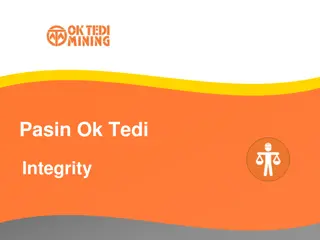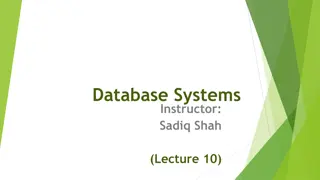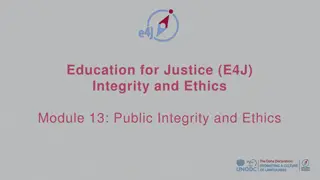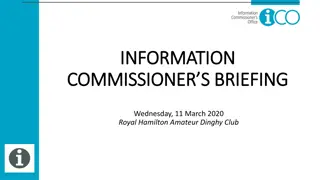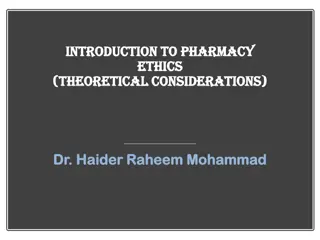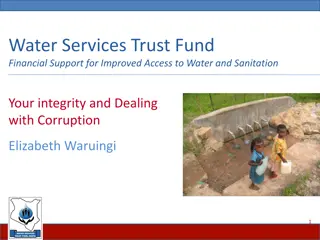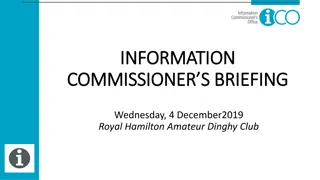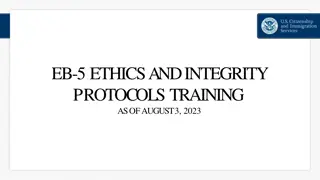Role of Integrity Commissioner in Ethics and Accountability Framework for City of Winnipeg
The presentation highlights the importance of ethics and accountability in a democracy, emphasizing the role of Integrity Commissioners in ensuring fair conduct by elected officials. It discusses the need for a formal framework to address ethical issues, complaints, and adherence to a Code of Conduct. Integrity Commissioners play a crucial role in providing guidance, education, and investigation to uphold ethical standards and support public interest.
Download Presentation

Please find below an Image/Link to download the presentation.
The content on the website is provided AS IS for your information and personal use only. It may not be sold, licensed, or shared on other websites without obtaining consent from the author.If you encounter any issues during the download, it is possible that the publisher has removed the file from their server.
You are allowed to download the files provided on this website for personal or commercial use, subject to the condition that they are used lawfully. All files are the property of their respective owners.
The content on the website is provided AS IS for your information and personal use only. It may not be sold, licensed, or shared on other websites without obtaining consent from the author.
E N D
Presentation Transcript
1 THE ROLE OF THE INTEGRITY COMMISSIONER FOR THE CITY OF WINNIPEG PRESENTATION TO THE OFFICE OF THE AUDITOR GENERAL OF MANITOBA JANUARY 29, 2019 Sherri Walsh Integrity Commissioner for the City of Winnipeg swalsh@hillcounsel.com
Ethics and Accountability Frameworks An effective democracy requires that the public have confidence in the actions of its elected officials. Ethics programs for elected officials ought not to be viewed as punitive in the criminal or quasi-criminal sense and unless they lead to disqualification from standing for office, they ought not to be viewed as professional regulatory programs. Modern Canadian ethics programs are best understood as mechanisms to encourage the best behaviour; and, to provide non- partisan, transparent fact-finding for the benefit of the electorate to help make an informed choice about who to vote for at the next election. Valerie Jepson, Integrity Commissioner for the City of Toronto, Apparent Conflicts of Interest, Electoral Officials and Codes of Conduct : Canadian Public Administration, Vol. 61, Suppl. (1) May, 2018, p.37. 2
Establishing a formal ethics and accountability framework allows for ethical issues and complaints about the conduct of members of Council, to be dealt with in a fair and consistent manner. The Integrity Commissioner forms an integral part of the City of Winnipeg s new ethics and accountability framework. That framework includes: a Code of Conduct which contains a mechanism for accepting, investigating and reporting on complaints made about the ethical conduct of members of Council; and an Integrity Commissioner who performs the dual role of providing advice about compliance with the Code and objective scrutiny of whether an elected official has met the standards set out in the Code. 3 Sherri Walsh Integrity Commissioner for the City of Winnipeg swalsh@hillcounsel.com
Integrity Commissioners carry out a range of functions: assist in the development of the ethical framework by suggesting content and commentary for Codes of Conduct; conduct education and training for members of Council and outreach for members of the community; provide advice and guidance to members to support compliance with the Code; investigate allegations that a member of Council has fallen short of compliance with the municipality s ethical framework and where appropriate, submit public reports on their findings and make recommendations, including recommending sanctions, that support the public interest. 4 Sherri Walsh Integrity Commissioner for the City of Winnipeg swalsh@hillcounsel.com
The dual role performed by the Integrity Commissioner: provides a vehicle by which Mayors and Councillors may obtain confidential and impartial advice about ethical dilemmas; and provides a mechanism for aggrieved citizens to complain if they believe their elected municipal officials are acting improperly, and in so doing, promotes public confidence in their municipal government. 5 Sherri Walsh Integrity Commissioner for the City of Winnipeg swalsh@hillcounsel.com
The Integrity Commissioner is independent of Council. The role is intended to encourage and sustain a culture of integrity and accountability for the members of Council of the City of Winnipeg. 6 Sherri Walsh Integrity Commissioner for the City of Winnipeg swalsh@hillcounsel.com
History of the Creation of the Role February 2009 City of Winnipeg Council asked the Province of Manitoba to review and amend the existing legislation to create stronger conflict of interest rules and guidelines for the City of Winnipeg and Council through such measures as the establishment of a separate municipal office for the Conflict of Interest Commissioner 7
December 2013 Council adopted the creation of an Office of Ethics Commissioner and asked the Province of Manitoba to amend the City of Winnipeg Charter to provide the Ethics Commissioner with investigative powers and the ability for Council to sanction members of council, statutory officers and members of the Winnipeg Police Service, on the recommendation of the Ethics Commissioner. The Province did not amend the Charter and advised that the City of Winnipeg had the authority to establish an Ethics Commission under the existing framework. 8 Sherri Walsh Integrity Commissioner for the City of Winnipeg swalsh@hillcounsel.com
June 17, 2015 Council instructed the Winnipeg Public Service to create an Office of Ethics Commissioner, with the maximum authority under the existing Charter. December 9, 2015 Council adopted the recommendation in the Report on the Office of the Integrity (Ethics) Commissioner that the Office of the Integrity Commissioner be created. February 22, 2017 Council adopted the recommendation of the Executive policy Committee that Sherri Walsh of Hill Sokalski Walsh Olson LLP be awarded a contract as the City of Winnipeg s Integrity Commissioner. 9 Sherri Walsh Integrity Commissioner for the City of Winnipeg swalsh@hillcounsel.com
City of Winnipeg Integrity Commissioner s Mandate https://www.winnipeg.ca/council/integritycommissioner/ Advisory Provide advice to Members of Council and Council as a whole on questions under the City s Code of Conduct. Investigative Investigate complaints and conduct inquiries into whether a Member of Council has contravened the City s Code of Conduct Educational Publish annual reports on the work of the office of the Integrity Commissioner, including examples in general terms of advice rendered and complaints received and disposed of. Other 10 Sherri Walsh Integrity Commissioner for the City of Winnipeg swalsh@hillcounsel.com Oversee the City s Lobbyist Registry
Approval of a Voluntary Lobbyist Registry April 26, 2017 approval of the creation of a Voluntary Lobbyist Registry for the City of Winnipeg. The Integrity Commissioner will oversee the Voluntary Lobbyist Registry, including assisting Members of Council, City Staff, and members of the public with questions regarding the Registry. The Integrity Commissioner is responsible for further review and changes to the process implemented by the City of Winnipeg. The Integrity Commissioner will recommend changes to the City of Winnipeg Charter, in consultation with the City Solicitor, related to the creation of a mandatory lobbyist registry. 11 Sherri Walsh Integrity Commissioner for the City of Winnipeg swalsh@hillcounsel.com
The Integrity Commissioners main role is to assist the members of Council so that they can perform their duties of office in a manner which is consistent with the Key Principles set out in the Code of Conduct. 12 Sherri Walsh Integrity Commissioner for the City of Winnipeg swalsh@hillcounsel.com
Key The public interest is best served when Members: perform their duties of office honestly and with integrity, impartiality and transparency, putting the public interest before private and self- interest; Principles - Code of Conduct for Members of Council for the City of Winnipeg conduct themselves in such a way as to promote respect for Council and municipal government; serve their constituents and the City in a conscientious and diligent manner and approach decision making with an open mind; and perform their duties of office and manage their private interests in a manner that promotes public confidence and trust in the political process. 13 Sherri Walsh Integrity Commissioner for the City of Winnipeg swalsh@hillcounsel.com
Government Ethics and Public Trust 14 Sherri Walsh Integrity Commissioner for the City of Winnipeg swalsh@hillcounsel.com
Integrity "Government ethics is not about being "good" or " a person of integrity".... In fact, conduct that is praiseworthy outside of government , such as helping a family member get a job or returning a favor one has been given, is considered wrong in a government context. Government ethics is about acting responsibly and professionally, as a government official or employee, under certain circumstances and following certain rules and procedures. It is about preserving institutional rather than personal integrity. Government ethics decision-making should be just another professional routine. Robert Weschler, Cityethics.org 15 Sherri Walsh Integrity Commissioner for the City of Winnipeg swalsh@hillcounsel.com
Three primary ethical duties required of public officials: 1. Do not abuse the public s trust that you will put the public interest before your private interest; 2. Act impartially when carrying out programs which are established by law; and 3. Account to the public for your activities and decisions. 16 Sherri Walsh Integrity Commissioner for the City of Winnipeg swalsh@hillcounsel.com
Public Trust "The proper operation of our city's government requires: That its public officials and employees act as fiduciaries entrusted with and responsible for the property and resources of the community; That they make governmental decisions and policies in the proper channels of the government structure , free of coercive or other improper influence; That they use their position in the best interests of the city rather than for personal interests, whether their own interests or those of their family, friends or business associates; and That they do not, directly or indirectly, in a positive or negative sense, treat anyone preferentially, that is, other than in a manner generally accorded to city residents. 17 Sherri Walsh Integrity Commissioner for the City of Winnipeg swalsh@hillcounsel.com Robert Weschler, Cityethics.org
" When public servants make decisions that are not or do not appear to be impartial, this seriously undermines public confidence in government.... While the vast majority of municipal officials are well-meaning, being well meaning is not enough . It is important that officials understand the conflicts they confront every day, appreciate their fiduciary obligations to city residents and recognize the importance of preventing conflicts from occurring, disclosing conflicts when they arise and withdrawing from any involvement in a matter where they have a conflict." Robert Weschler, Cityethics.org 18 Sherri Walsh Integrity Commissioner for the City of Winnipeg swalsh@hillcounsel.com
Tools used to promote ethical conduct: 1) A code of conduct which should be used to promote ethical conduct as a best practice rather than simply to punish conduct after it has occurred. 2) Access to an Integrity Commissioner who can assist in avoiding misconduct in two ways: i) by providing advice on a proactive basis; ii) by providing education generally, through interpretation bulletins, reports, seminars, investigations and commentary. 19 Sherri Walsh Integrity Commissioner for the City of Winnipeg swalsh@hillcounsel.com
Annotated Code of Conduct https://www.winnipeg.ca/council/integritycommission er/pdfs/CodeofConduct_Commentary.pdf Examples of what is regulated: Conflicts of Interest, Confidential Information, Use of Influence, Acceptability of Gifts and Benefits beyond what is required by the MCCIA Use of Municipal Staff and Resources, including during elections Conduct towards staff, the public and each other 20 Sherri Walsh Integrity Commissioner for the City of Winnipeg swalsh@hillcounsel.com
Conflict of Interest Encountering a conflict of interest is not generally a problem. What matters is that the conflict be dealt with responsibly and transparently. In addition to conflicts under the MCCIA, a Code should regulate and clarify rules about: Non-pecuniary interests Apparent conflicts of interest 21 Sherri Walsh Integrity Commissioner for the City of Winnipeg swalsh@hillcounsel.com
Gifts and Benefits Officials are merely part of the government, individuals sitting in government positions at the moment. They are doing, or supposed to be doing, nothing but their government work, and to be paid nothing but what the budget says they are paid. In other words, officials do not personally act and should not personally benefit from what they are required to do as part of their public role. They should not be given special treatment, that is, no tickets, invitations to play golf or go on a vacation, or the like, because they should do nothing special for anyone. They should not be involved in reciprocity or feel gratitude to anyone in their role as an official. Robert Wechsler 22 Sherri Walsh Integrity Commissioner for the City of Winnipeg swalsh@hillcounsel.com
A code should address gifts in two ways: by regulating what is acceptable; and by requiring public disclosure of gifts that are accepted. 23 Sherri Walsh Integrity Commissioner for the City of Winnipeg swalsh@hillcounsel.com
Acceptability of Gifts Any gift or benefit which might reasonably be seen to have been given to influence the Member in the exercise of a duty or function of his or her office should not be accepted. A Member s family member or staff should not accept gifts which give the same appearance 24 Sherri Walsh Integrity Commissioner for the City of Winnipeg swalsh@hillcounsel.com
Keep Politics and Management Separate Policy decisions are Council s business; management is management s business. To promote good relationships, staff must respect democracy, and councilors must respect professional management. What you call me tells me what you think of me, especially in the eyes of the public. Municipal professionals understandably prefer being called by their title or staff, rather than bureaucrats. Local elected representatives similarly prefer to be called by their title or elected representatives, rather than politicians. Fenn, M. & Siegal, S. (2017). The Evolving Role of City Managers and Chief Administrative Officers. IMFG Papers on Municipal Finance and Governance, No. 31. Toronto: University of Toronto, IMFG Institute on Municipal Finance and Governance. 25 Sherri Walsh Integrity Commissioner for the City of Winnipeg swalsh@hillcounsel.com
Dont Air Dirty Laundry in Public Municipal government operates in a political arena, with all that that implies. As a result, a councillor may quite properly or even simply for political reasons accuse staff of being incorrect, lacking in research or creativity, being insensitive to community concerns, or being too slow to deal with an issue. Staff may not like it, but they have broad shoulders and it is the right of the democratically elected representative to say such things if they are warranted. But there are limits that should not be exceeded. A councillor should never accuse a staff member publicly of stupidity, unethical behaviour, or incompetence. If an elected representative feels that way about a member of staff, he or she should take it up with the CAO (or with the head of council, in the case of the CAO), in private. Likewise, if a staff member feels his or her integrity or honesty is being questioned, or if workplace interactions with a councillor are inappropriate or demeaning, he or she should take the matter up with the CAO and take advantage of the protections afforded to all employees, including in serious cases, access to the municipal integrity commissioner. Fenn, M. & Siegal, S. (2017). The Evolving Role of City Managers and Chief Administrative Officers. IMFG Papers on Municipal Finance and Governance, No. 31. Toronto: University of Toronto, IMFG Institute on Municipal Finance and Governance. 26 Sherri Walsh Integrity Commissioner for the City of Winnipeg swalsh@hillcounsel.com
Workplace Harassment As an example, the Code of Conduct for Members of Council of the City of Winnipeg provides: 8. Respectful Conduct a. All Members have a duty to treat members of the public, one another, City staff and their own staff with respect and without abuse, harassment, or intimidation. 27 Sherri Walsh Integrity Commissioner for the City of Winnipeg swalsh@hillcounsel.com
The rationale for requiring decorum in Council and Committee meetings was well stated in the Commission Report of The Honourable Madam Justice Denise E. Bellamy (Toronto Computer Leasing Inquiry/Toronto External Contracts Inquiry, 2005): Ill-mannered behaviour impedes the effectiveness of Council as a decision-making body and diminishes the stature of Council in the eyes of the public. Principled criticism of others positions is to be expected at times, but it should be delivered respectfully and civilly. Angry or abusive language and personal attacks are inappropriate at all times. 28 Sherri Walsh Integrity Commissioner for the City of Winnipeg swalsh@hillcounsel.com
Recent Example of Workplace Harassment Taken from the Office of the Integrity Commissioner of Whitchurch-Stouffville, Final Report, September 20, 2017 29 Sherri Walsh Integrity Commissioner for the City of Winnipeg swalsh@hillcounsel.com
Enforcement of the Code of Conduct The creation of mechanisms to deal with complaints about illegal or unethical conduct is essential to assuring the public that the Code is working in a meaningful manner. Complaint Protocol Appendix B to the Code of Conduct for Members of Council Sets out process for complaints: Receiving, investigating and reporting An articulated process manages parties expectations 30 Sherri Walsh Integrity Commissioner for the City of Winnipeg swalsh@hillcounsel.com
Integrity Commissioner s Jurisdiction Integrity Commissioners provide one form of accountability. Other forms include the courts and the police. If citizens suspect corruption, they can make a report to the police in the hope that criminal prosecution will result. Municipalities can also be sued because they have legal status which is similar to a provincially incorporated business. Legal action, however, is expensive and uncertain. Supplementing the courts as a remedy for bad behaviour by Councillors is one of the main reasons that accountability officers have been established. Andrew Sancton: Accountability Officers and Integrity in Canadian Municipal Government , History on Municipal Finance & Governments: Perspectives , No. 17/217 at p. 2. 31 Sherri Walsh Integrity Commissioner for the City of Winnipeg swalsh@hillcounsel.com
Complaints Outside Integrity Commissioner s Jurisdiction See section 6 of the Complaint Protocol: https://www.winnipeg.ca/council/integritycommission er/pdfs/CodeofConduct_Commentary.pdf 32 Sherri Walsh Integrity Commissioner for the City of Winnipeg swalsh@hillcounsel.com
Accountability officers have limited formal authority, but considerable power to influence public opinion. Such power must be used wisely and cautiously because it has the potential to destroy reputations and determine the outcomes of local elections. The most important function of accountability officers is to provide citizens with the kind of information they need in order to make intelligent electoral choices. Sancton: IMFG Perspectives, supra, at Executive Summary. 33 Sherri Walsh Integrity Commissioner for the City of Winnipeg swalsh@hillcounsel.com
Complaint Process Procedural fairness requires a process which allows all parties to adequately participate in the review and resolution of the complaint. The respondent must have the opportunity to have a clear understanding of the nature of the case being presented against them , and an opportunity to respond not only to the matter set out in the complaint, but also to the Commissioner s findings of fact and fault , prior to the Commissioner publishing their report to Council. The Integrity Commissioner s report should be written in plain language. Reports are not so much about finding fault, as about education so that municipal governments can function better and members of the public may gain confidence that their municipal council is operating with integrity. 34 Sherri Walsh Integrity Commissioner for the City of Winnipeg swalsh@hillcounsel.com
An Integrity Commissioners report shows, if there have been transgressions, where the behavior of elected officials has fallen below the accepted standard. An Integrity Commissioner s investigation report is not simply the conclusion of a technical exercise to determine whether there has been a breach of codified standards of behavior. This report is not simply the sum total of analysis in fact and law. We are not simply assigned the duty of bringing adjudication to grievances between individuals. Principles Integrity Commissioners Recommendations Report, May 29, 2018, for the Town of Whitchurch-Stouffville. The main goal in having a process to accept, investigate and report on complaints is to be able to make recommendations that serve the public interest. 35 Sherri Walsh Integrity Commissioner for the City of Winnipeg swalsh@hillcounsel.com
Consequences of Finding a Council Member is in Breach of the Code Framework is not a criminal or quasi-criminal system; nor a professional regulatory system. The most important function of Municipal Accountability Officers is to provide much-needed information for local media, for potential Council candidates, and for conscientious citizens. Reports of Accountability Officers are rightly taken seriously; they can do much potential damage to reputations . . . of Municipal Councillors. This is both their greatest strength and the reason their office must be scrupulously cautious and fair-minded. Sancton: IMFG Perspectives, supra, at p. 10. 36 Sherri Walsh Integrity Commissioner for the City of Winnipeg swalsh@hillcounsel.com
As the Integrity Commissioner for Toronto points out, even in the face of extreme sanctions, an elected official can still stand for office and be successful. Valerie Jepson, Apparent Conflicts of Interest, Electoral Officials and Codes of Conduct, supra, at p.37. There are many examples across the country where elected officials determined to have contravened the Code of Conduct and who are the subject of sanctions stand for re-election and a return to office. Consider Mayor Hazel McCallion who was re-elected by a significant majority after the Cunningham Report concluded that she was in an improper conflict of interest for the benefit of her son; consider the Honourable Harinder Takhar, the first Minister found to have contravened the Member s Integrity Act, 1994, who was re-appointed to Cabinet and re- elected as an MPP. Valerie Jepson, Apparent Conflicts of Interest, Electoral Officials and Codes of Conduct, supra, at p.49. 37 Sherri Walsh Integrity Commissioner for the City of Winnipeg swalsh@hillcounsel.com
Challenges Associated with the Role Integrity Commissioners make rulings about sensitive, sometimes controversial issues relating to the ethical standards which elected officials commit to following. 38 Sherri Walsh Integrity Commissioner for the City of Winnipeg swalsh@hillcounsel.com
The issues Integrity Commissioners address are often complex: Integrity Commissioners focus on the ethical behaviour and reputations of individual Councillors, a subject about which most citizens are likely to feel qualified to judge, even if the issues involved are many-sided. . . . Integrity Commissioners have the unenviable task of enforcing ethical behaviour without being so strict in their interpretation of the Codes of Conduct, that they make it impossible for mere mortals to engage in politics, an activity that for many citizens is likely considered unsavoury, almost by definition. Sancton: IMFG Perspectives, supra, at p. 6. 39 Sherri Walsh Integrity Commissioner for the City of Winnipeg swalsh@hillcounsel.com
In performing their work, therefore, Integrity Commissioners must: avoid politicization of the office; ensure effective communication of their mandate and decisions while maintaining the obligations of confidentiality necessarily associated with the work; address inherent challenges in the subject matter itself; and balance the need to adhere to standards with practical considerations so as to not make it impossible for elected officials who are human, to engage in politics. 40 Sherri Walsh Integrity Commissioner for the City of Winnipeg swalsh@hillcounsel.com
While the Integrity Commissioner should not be drawn into political debate, they cannot ignore the political climate and context in which they function and must be alert to areas which require better education for the public and members of Council. 41 Sherri Walsh Integrity Commissioner for the City of Winnipeg swalsh@hillcounsel.com
Emerging Issues The role and duties of members of Council for the City of Winnipeg are not defined in TheCity of Winnipeg Charter. By contrast, for example, The Municipal Act of Manitoba defines the general duties of members of Council: General duties of members 83(1) Each member of a council has the following duties: (a) to consider the well-being and interests of the municipality as a whole and to bring to the council's attention anything that would promote the well-being or interests of the municipality; (b) to participate generally in developing and evaluating the policies and programs of the municipality; (c) to participate in meetings of the council and of council committees and other bodies to which the member is appointed by the council; (d) to keep in confidence a matter that is discussed at a meeting closed to the public under subsection 152(3) and that the committee decides to keep confidential until the matter is discussed at a meeting of the council or of a committee conducted in public; (d.1) to comply with the code of conduct for members of council; (e) to perform any other duty or function imposed on the member by the council or this or any other Act. Duties of the head of council 83(2) In addition to performing the duties of a member of a council, the head of council has a duty (a) to preside when in attendance at a council meeting, except where the procedures by-law or this or any other Act otherwise provides; (b) to provide leadership and direction to the council; and 42 (c) to perform any other duty or function assigned to a head of council by the council or by this or any other Act. Sherri Walsh Integrity Commissioner for the City of Winnipeg swalsh@hillcounsel.com
More education and perhaps amendments to The City of Winnipeg Charter are required to better define the role and duties of Members of Council. 43 Sherri Walsh Integrity Commissioner for the City of Winnipeg swalsh@hillcounsel.com
Desired Legislative Changes to Enhance the City s Accountability Framework Changes to the City of Winnipeg Charter which would: Legislate the mandate and role of the Integrity Commissioner. Identify appropriate penalties for breaches of the City s Code of Conduct. Grant investigative powers to the Integrity Commissioner. Legislate confidentiality for the Integrity Commissioner s advice and investigative functions. Legislate the creation of a Lobbyist Registry. Identify appropriate penalties for failing to register Lobbyist activities. 44 Sherri Walsh Integrity Commissioner for the City of Winnipeg swalsh@hillcounsel.com





